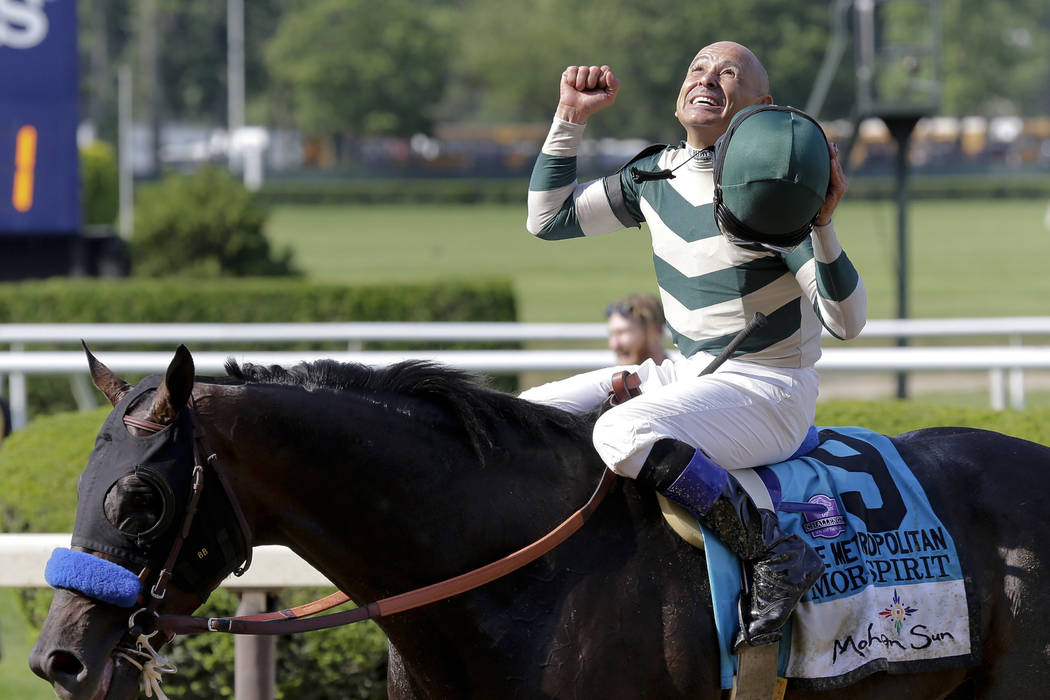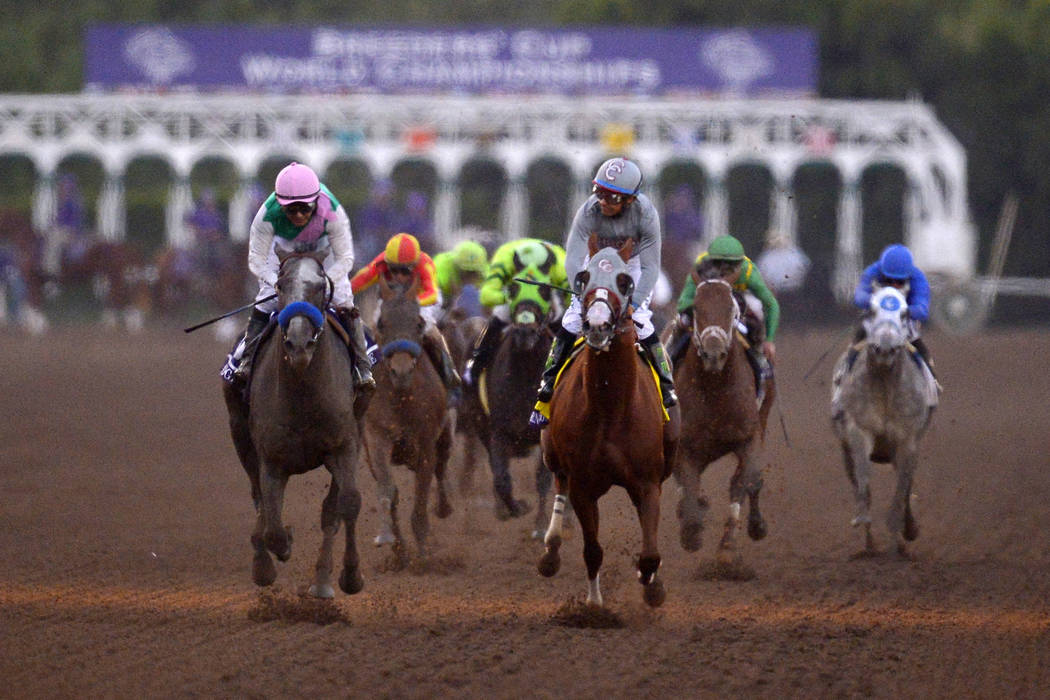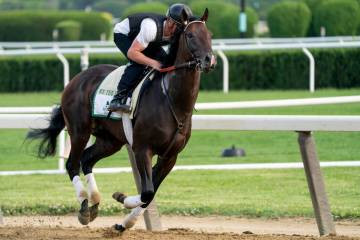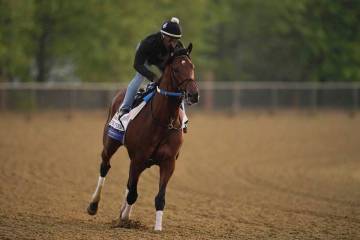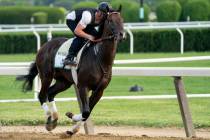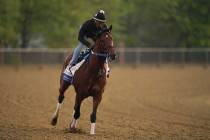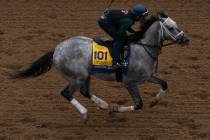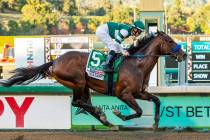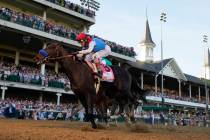Interactive handicapping corps started cold but is making progress
When strangers stop me on the street, they invariably ask me how many winners our interactive handicapping corps is picking.
Actually, no one but the police stops me on the street, and that’s a story for another day. I do, however, occasionally hear from readers wondering if we’re killing it at the windows and, if so, how they can get involved.
The “getting involved” part is easy. Simply go to the end of this piece and you’ll find details on how you can enlist in the Review-Journal’s #RJhorseracing handicapping group.
But, to answer the first question, let’s look at the first 17 races we’ve collectively handicapped and see what we can learn from the good, the bad and the ugly.
We’ll start with the ugly.
Out of 17 races, we correctly picked the winner only twice. That means if you blindly bet $2 to win on each of our selections, you’d be down $22.30 at this point.
A slightly more encouraging sign would be looking at our second choices, which won five times. Toss in two third-place finishers and you have nine winners from our top three picks out of 17. You would be down $17.20 if you bet our top three picks across the board in every race.
It’s not all bad news, though. Our collective choices seem to be getting better, with the group picking winning exactas each of the past two weeks, returning $28.40 and $21.60 on a $2 bet.
I’d like to think that’s partly because we’ve been tackling the toughest races possible on cards at eight racetracks, not counting Parx, the host of this week’s featured races. Those wide-open betting affairs at often unfamiliar tracks are great exercises to hone one’s handicapping skills.
I’ve also heard from group members who have cashed some nice bets in recent weeks by looking for value rather than blindly betting the horse that gets the most support, including last week’s second-choice winner, Harlan Punch ($14.00), and the previous week’s third-choice winner, Oscar Nominated ($9.40). That’s in keeping with our guiding philosophy that it’s not just about picking winners; it’s about getting amply rewarded when you do.
I’ll revisit our scorecard occasionally to update you on our progress and will come up with a solution to share the data with our group. Meantime, on to this week’s challenges.
#RJHorseracing featured races
This week we’re focusing on the signature events at Parx Racing (still Philadelphia Park to us old-timers): the Cotillion Stakes (G1) and Pennsylvania Derby (G1).
The races are a bit different from the wide-open affairs we’ve been targeting lately, as both have heavy favorites trained by Bob Baffert and ridden by Hall of Fame rider Mike Smith, or “Money Mike,” as he’s known to his legion of fans. Our handicappers foresee a big weekend for the California invaders.
In the Cotillion, the picking was heavily in favor of Abel Tasman (the 8-5 morning line favorite), with It Tiz Well (4-1) and Lockdown (8-1) filling out the placings.
And they make it a Baffert-Smith double by endorsing West Coast (8-5) in the Pennsylvania Derby over Irap (3-1) and Timeline (5-1).
“Tough to avoid the OBVIOUS FAVORITES this week,” sums up reader Robert Ranfone. “Awesome horses!”
I’ll climb out on a limb and pick Irap to upset West Coast. I thought he ran a winning race in the Travers Stakes when caught wide and the favorite likely won’t get away with dawdling fractions as he did that day.
In the Cotillion, I’ll concede Abel Tasman’s superiority.
You’re invited to get in on the action. Simply drop me an email or post on hop on Twitter (using the hashtag #RJhorseracing) to express your interest and you’ll get an alert on Wednesday when I post past performances for next week’s racing puzzles. We’re getting better, but we can still use your help!
Contact Mike Brunker mbrunker@reviewjournal.com or 702-383-4656. Follow @mike_brunker on Twitter.
Ellis Starr's analysis and betting strategy
Cotillion Stakes
It Tiz Well finished second to five length winner Elate in the Alabama Stakes, gamely holding second over Salty. It Tiz Well beat four other Cotillion entrants in that race and one race prior earned a career best 107 Equibase Speed Figure winning the Delaware Oaks, beating two other Cotillion entrants. She's as good as the likely favorite, Abel Tasman, and offers much better value for win bets opening at 4 to 1.
Abel Tasman has run three of the best races of her career since blinkers were added in May. The horse she beat in the Coaching Club American Oaks, Elate, came back to beat five Cotillion entrants in the Alabama the next month so she could be very tough once again.
I would definitely make a win bet on It Tiz Well at odds of 2 to 1 or more. I would also consider Monmouth Oaks winner Teresa Z and Alabama stakes third-place finisher Salty for second and third positions on exacta and trifecta tickets and use Mopotism and Sine Wave in third position on trifecta tickets.
Pennsylvania Derby
Even though West Coast has a higher probability to win than any other horse in the field, the 12/1 starting odds on Outplay make him more attractive from a betting perspective. Outplay tied his previous career best 108 Equibase Speed Figure with a five-length victory in the Curlin Stakes around two turns at Saratoga at the end of July. Although all three of his wins have come when leading from start to finish, I believe Outplay can sit off the pace and run just as well.
West Coast has no real blemishes on his record, having won five of his seven career starts and winning three stakes races in a row, the last two with 112 and then 115 Equibase Figures. He's also two-for-two with Mike Smith in the saddle.. He also can win on the lead as he did last month in the Travers or he can come from off the pace as he did in winning the Los Alamitos Derby and Easy Goer Stakes prior to that. Bob Baffert wins nearly 45 percent of the time in a graded stakes when his horses won their last start.
Game Over is the most lightly raced horse in the field, having started just four times, and has run exceptionally well in all of them except for his fifth place effort behind Irap in the Ohio Derby. For exotic wagers like the exacta and trifecta, Game Over must be used.
Ellis Starr is the national racing analyst for Equibase. Visit the Equibase website for more on the race or to purchase handicapping products.



